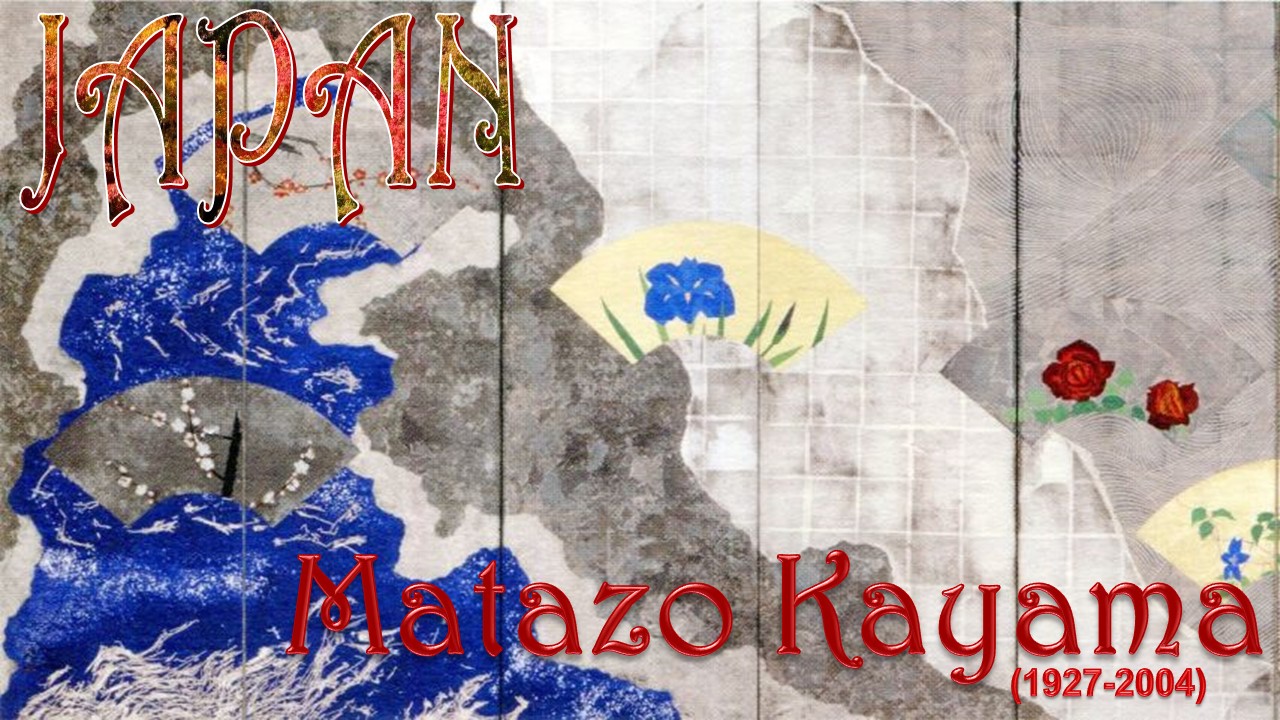Matazo Kayama 1 (Japan, 1927-2004) - PowerPoint PPT Presentation
Title:
Matazo Kayama 1 (Japan, 1927-2004)
Description:
Matazō Kayama (1927-2004) was a Japanese Nihonga painter of the 20th century. He was a painter who employed a mixed technique. In 1973 he was granted the prize for Japanese Art and, in 1980, he received the Prize of the Ministry of Culture. He became a professor at the Tokyo University of the Arts in 1988 – PowerPoint PPT presentation
Number of Views:8
Title: Matazo Kayama 1 (Japan, 1927-2004)
1
JAPAN
Matazo Kayama
(1927-2004)
2
Turu 1980
3
Matazo Kayama (1927-2004) was born in Kyoto, the
son of a designer of Kimono. He used to play in
his father's studio, and loved to see him and his
disciples at work sketching and painting. He also
learned a lot from his father's collection of
international art books. Kayama started making
art, and when he was 13 years old he entered the
Japanese Painting Academy in Kyoto. In 1944 he
went on to study traditional Nihonga techniques
at Tokyo National Academy of Fine Arts. In 1949,
he graduated from the Tokyo University of the
Arts with a degree in painting. Around 1960 he
traveled, gave exhibitions, and held conferences
abroad. Starting in 1950, he participated in
expositions of The Association of Young Artists
(Shinseisaku gakai), wherein he was awarded four
times. He became a famous painter in his early
30's. From 1958 on, he participated in
international expositions of modern Japanese
artists. In 1967, he also participated in the
exhibition Masterpieces of Modern Japanese
Painting at the State Hermitage Museum of Saint
Petersburg and at the Pushkin Museum in Moscow.
In 1957, he was granted the Young Painters Prize
in the Asahi News. In 1973 he was granted the
prize for Japanese Art and, in 1980, he received
the Prize of the Ministry of Culture. He became a
professor at the Tokyo University of the Arts in
1988. Towards the end of the 1970s, several state
organizations commissioned him to make mural
decorations, including the Japanese Embassy in
the United States. He had held a private
exhibition in Paris in 1990. He held exhibitions
at the Central Museum of Beijing (1993) and
British Museum (1996)
4
Rain 1998
Hydrangea
5
Still life
6
Small bird
Wind 1974
7
Dobutsuen, kirin (Zoo, giraffes) 1972
8
Breeze
9
(No Transcript)
10
(No Transcript)
11
(No Transcript)
12
(No Transcript)
13
(No Transcript)
14
(No Transcript)
15
Frozen Forest Ookawa Museum Foundation
16
Ye hoe Veronica persica 1970
17
Moon and zebra 1954
18
Moon and the camel 1957
19
Three small birds
20
(No Transcript)
21
Ami (Clothes with Mesh-patterned Print)
Hoshi-ami (Clothes with Mesh-patterned Print)
22
Clothes with Red
Poppy
23
(No Transcript)
24
Sarasa 1989
25
(No Transcript)
26
(No Transcript)
27
(No Transcript)
28
(No Transcript)
29
Shirobotan Hori Art Museum
30
Roses
31
Hana flowers
32
(No Transcript)
33
Snow 1978 National Museum of Modern Art, Tokyo
Kingfisher 1990
34
Venus Comb and Plover 1972
Plower and Shell 1989
35
Sunflower
Long-Horned Beetle (1970)
36
Tetra 1989
37
White peony (1990
38
(No Transcript)
39
(No Transcript)
40
Hori Art Museum
41
(No Transcript)
42
(No Transcript)
43
(No Transcript)
44
(No Transcript)
45
Hori Art Museum
46
Morning Glory 1990
47
Hori Art Museum
Exhibition poster
48
(No Transcript)
49
In Screen with Floral Fans (1966), Matazo
Kayama incorporated traditional motifs, such as
fans, waves and patchworks of torn paper, with
bold color and very large designs Yamatane Museum
of Art
50
(No Transcript)
51
The BMW Art Car Project was introduced by the
French racecar driver and auctioneer Hervé
Poulain, who wanted to invite an artist to create
a canvas on an automobile. In 1975, Poulain
commissioned American artist and friend
Alexander Calder to paint the first BMW Art Car.
Since Calder's work of art, many other renowned
artists throughout the world have created BMW Art
Cars, including David Hockney, Jenny Holzer, Roy
Lichtenstein, Robert Rauschenberg, Frank Stella,
and Andy Warhol. In 1990 Matazo Kayama painted
on the body of BMW525i for BMW Art Car Project.
He used Japanese traditional technique called
"kirikane". Leaves of gold and platinum were cut
very carefully. And glue on all over the BMW's
body.
52
(No Transcript)
53
Text pictures Internet Copyright All the
images belong to their authors Presentation
Sanda Foisoreanu
2016
Sound Memoirs of a Geisha - Music
composed and conducted by John Williams,
featuring cello solos by Yo-Yo Ma and
violin solos by Itzhak Perlman































